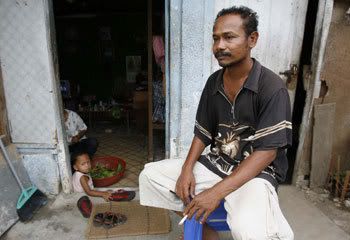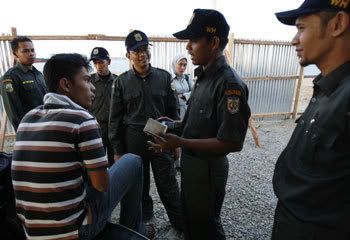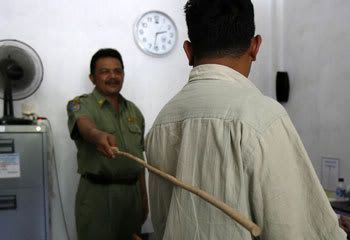|
The Sunday Mail, Brisbane, Australia, 10 December 2006Morality police rule AcehBy Cindy Wockner AS THE 1.2m-long rattan cane landed across his back, the 37-year-old pedicab driver felt more than just pain. He also felt shame as six times the 1cm thick cane came down upon him.
Then he felt angry. The crowd which had gathered to witness the spectacle of his court-imposed 40 strokes of the cane being dished out could clearly see the humiliated man's face and identity. But the identity of the man wielding the cane was hidden behind a mask. On the seventh stroke, the man could take it no longer and fainted. The full 40 strokes would have to wait for another day. Saifullah Bin Ali's crime was drinking alcohol -- scotch and vodka -- in a place which forbids the consumption of alcohol by its majority Muslim population. The men who had caught him -- the Wilayatul Hisbah -- might share the same name as their counterparts in Saudi Arabia in the feared Vice and Virtue squad -- but Mr Bin Ali's crime was committed in a place much closer to Australia. He is one of about 135 people caned in Aceh, the so-called "veranda of Mecca", in the past 15 months for crimes such as drinking or selling alcohol, having sexual relations outside marriage and gambling. The Indonesian province that was so devastated by the 2004 Boxing Day tsunami has had the right to enforce Sharia or Koranic law since 1999 but it has only been since August last year that it has begun using the harsher sentencing regime and conducting public canings. While in other provinces Sharia-inspired Government by-laws are being enacted to enforce such things as Islamic dress codes for bureaucrats, Aceh is the first Indonesian province to enact Sharia and then use the courts to enforce its punishment. So far the laws do not go so far as to allow the more feared punishments of stoning or the lopping-off of hands but there are draft proposals to go one step further -- to allow the tips of fingers to be cut off for the crime of stealing. Last week The Sunday Mail went on patrol with the Sharia police in the Acehnese capital, Banda Aceh, as they cruised the streets looking for young unmarried couples showing too much affection and for women flouting the rules that demand all females must wear the jilbab or headscarf and must not wear tight and figure-hugging clothes. Female officers carry with them leaflets showing diagrams of appropriate and inappropriate dress, which mark figure-hugging clothes and women without headscarves with a red cross.
Caught in an embrace at the ferry terminal, Linda, 20, and her boyfriend, Agus, 22, are horrified and humiliated. Linda hangs her head in shame and averts her gaze as an officer delivers a stern lecture. "You are not married. It is not good to sit here any longer like this. For any couple sitting like this there will be more temptation," the officer says, warning them that "following temptation" is illicit sex outside marriage. The officer wants Linda and Agus to ride back to the Sharia police office in the team's clearly marked wagon in order to make statements and for them to be given the first of three official warnings, after which more serious action would be taken. But they are embarrassed -- they don't want to risk the chance of any family members or friends seeing them under the guard of the Sharia police. Eventually a compromise is worked out -- they hand over their ID cards and promise to visit the office the next day to sign warning statements. Further on, another couple are fishing together at Ulee Lheue. Quickly they pull out their marriage certificates to prove their closeness is legal but even so they get a little lecture from the brown-uniformed men -- it's time for the Maghrib dusk prayer soon and it's not good to be out after dark. But the couple don't mind the interruption and support the Sharia police 100 per cent. An Islamic teacher, Mawardi Siregar, in fact thinks the Sharia police are not active enough in using their powers. "Shariat Islam in Aceh is only lipstick," Mr Siregar says, explaining his view that the way it is being enforced at present is window dressing and nowhere near as effective as it should be. His is not a view shared by Syarifah Rahmatillah, the director of an Acehnese women's group. As she prepared to travel to Mecca to make the haj pilgrimage, Ms Rahmatillah said Islam was a flexible religion and women should not be forced to wear the headscarf. Religion should come from the heart, not because of political reasons, she adds. And the laws have been criticised as promoting vigilantism in the community and unfairly targeting women and the poor. Officials disagree, saying that jailing a family's breadwinner brings hardship to the whole family. Caning him does not. The next young couple to be stopped by the Sharia officers are not so happy about the interruption. They may be male and female but they are not boyfriend and girlfriend and they are not being intimate as they sit by the ocean for what they say is a friendly chat. On it goes. As evening falls, the truck drives around darkened parks and housing estates, looking for couples doing the wrong thing. People are clearly wary to the point of being frightened of these men in brown shirts. One young couple quickly split and run in opposite directions. Women pull scarves from their shoulders to their heads as they spot the police coming in their direction. A small, blue booklet titled The Law of Islam in Aceh at a Glance gives the details and the history of how a form of Sharia law came to be implemented in Aceh after first being mooted in 1948. It came eventually in 1999, when Aceh was granted special autonomy from Jakarta as part of a package aimed at ending the three decades of conflict with the Free Aceh Movement, also known as GAM. In the end it was the tsunami that provided the final impetus to end the civil war, and tomorrow the province will hold its first free elections since the peace agreement. It comes as the second anniversary of the tsunami approaches. With the earthquake epicentre off Indonesia, Aceh bore the brunt of the resulting waves that washed away the lives of up to 160,000 people in Indonesia. Many in Aceh said at the time it was God's will and punishment for their wayward morals. The full implementation of Sharia came after the natural disaster. The blue book lists the crimes and the punishment, including: - Not going to the mosque for Friday prayers on three occasions: six months' jail or three strokes of the cane. The book includes grainy but graphic images of bare buttocks being caned in Malaysia, Pakistan and Singapore. The purpose of this, according to Natsir Illyas, the director at the Banda Aceh Sharia police office, is to show that Aceh's version of caning is much more humane and much less painful than in other countries that mete out the punishment.
Wielding one of the canes, which he says must be the regulation 1.2m long, Mr Illyas demonstrates how the caner must have a straight arm at all times and not bent, thus reducing the force behind the blow. And if blood is drawn, the caning must stop immediately. A doctor must be on hand at all times to monitor the cane. Mr Illyas says the point of public caning in Aceh, usually after Friday prayers, is not to inflict torture or pain but to bring shame and embarrassment on the "canees" and educate them that their actions are wrong. Pedicab driver Mr Bin Ali disagrees. To the contrary, the seven canes he endured four months ago before collapsing were, according to him, very painful indeed. To prove the point, he lifts his shirt, pointing to the marks across his back, saying that the welts had extended to his upper arms as well. Mr Bin Ali, a Muslim, disagrees with caning as a punishment and believes Sharia law has gone too far. "I felt sad because I was caned in front of all the people and also I couldn't see the face of the person caning me," Mr Bin Ali says. "I was in tears when I was being caned because I was very ashamed and I couldn't see the executioner's face. "I wanted to see his face clearly." With so many Westerners and non-Muslims now in Aceh helping with tsunami reconstruction, there has been a grey area over whether the laws pertain to non-Muslims. Mr Musdaruddin, the director of the Provincial Islamic Sharia Implementation office, says they don't -- but officials ask Westerners in Aceh to respect the local laws even though they are exempt from arrest or caning. And Mr Musdaruddin says the number of people being caned has decreased in recent months -- evidence, he says, that the laws are working and that their educational purpose is successful. © Queensland Newspapers. |

 Caned: Pedicab driver Saifullah Bin Ali was sentenced to 40 strokes for drinking alcohol
Caned: Pedicab driver Saifullah Bin Ali was sentenced to 40 strokes for drinking alcohol
 'Humane': The director of the Banda Aceh Sharia police demonstrates the 'softer', straight-armed method of caning
'Humane': The director of the Banda Aceh Sharia police demonstrates the 'softer', straight-armed method of caning